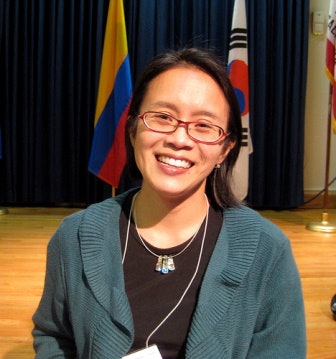 Dr. Maricel Santos of San Francisco State University co-organized the LESLLA conference.
Dr. Maricel Santos of San Francisco State University co-organized the LESLLA conference.SAN FRANCISCO—At last week’s eighth annual Low Educated Second Language and Literacy Acquisition for Adults (LESLLA) conference, held at the Mission Campus of City College of San Francisco (CCSF), the 160 or so attendees gained insight into research and practices on working with adults that have limited literacy or education in their native and/or second language.
According to Dr. Anne Whiteside, an English as a Second Language (ESL) teacher at CCSF, the conference is the only one of its kind. Attendees could choose between sessions on topics such as “Gender, Power and Print Literacy in a LESLLA Classroom,” “Non-Literate Finnish Learners and a Ten-Month Challenge” and “Making Literacy Compelling: Embedding Literacy in Livelihood and Opportunity.” Other events included a presentation by Nigerian-born artist Victor Ekpuk about his use of Nsibidi, a graphic system from his native country; and a talk by Dr. Norma Guillard from the University of Havana about participating in the Cuban National Literacy Campaign, followed by a movie about women literacy workers in Cuba, “Maestra.”
The range of options appealed to Stephanie Love, who came from Turin, Italy, where she teaches English and Italian and researches immigration issues.
“I’m really interested to see the diversity of what’s being offered,” said Love, who was presenting a paper on testing immigrants in Italy.
An opening address was delivered by Dr. Robin Waterman, director of La Conexion Comunitaria de Aurora in Colorado, about her work with mostly illiterate women in El Salvador using methods of the late Brazilian Paulo Freire, who advocated education as a tool to change socioeconomic status and for teachers to be facilitators of dialogue, rather than simply depositing information in students’ heads.
Waterman discussed topics that would be meaningful to the women as well as valuing the experience and knowledge they bring to the group. She also discussed her research in the U.S. on the importance of teaching ESL based on students’ goals, such as talking to their children’s teachers.
Hearing about this sort of instruction helps, says Elizabeth Weal, a literacy teacher at the Sequoia Adult School in Redwood City, south of San Francisco.
“It’s very important to always be looking for new strategies for low-level literacy,” Weal said. “Contextualizing ESL is something I aim to do, so hearing something like this inspires me that maybe I can do this after all.”
Bindu Jallabah, who started the Karanso Africa nonprofit in Philadelphia, works half of the year in Liberia teaching literacy. She says she saw how traditional literacy approaches often don’t apply to those most in need.
Jabballah began working in the literacy field for personal reasons—her mother, along with the other women in her family, were not allowed to go to school and could not read.
“My mother worked very hard and overcame obstacles,” Jallabah said. “She became a businesswoman and traveled the globe and is a legislator in Liberia. But no matter how hard you work, there is always a stigma. When you’re a child, it’s a natural reaction that, when you feel someone you love is being undermined, you wouldn’t want this to happen again to anyone.”
Jallabah emphasized the importance of literacy having an immediate effect, such as when she taught an older woman in her village how to write the numbers one through 10, so she could write the Western Union code herself, or showing her mother how to fill out the I-94 card for customs after she had a bad experience with immigration officials. Sharing ideas with others makes a big difference, Jaballah said.
“It’s very helpful to be around like minds,” she said. “I’m sitting by myself wondering how to implement my ideas, and it turns out people have done research on what I’m talking about.”
Bringing those like minds together with researchers and teachers from around the world is why she organized the conference with Whiteside, says Dr. Maricel Santos, who trains ESL teachers at San Francisco State University.
“We’re about professionalization and helping people to feel part of something,” she said. “There’s no other organization in the entire world that focuses on low-level literacy. It’s like how you join Facebook so you can feel connected. You come to LESLLA so you can feel connected.”















